Veterans Treatment Courts: Objectives, Operation, and Australia
VerifiedAdded on 2023/04/26
|9
|2498
|159
Report
AI Summary
This report provides a comprehensive analysis of Veterans Treatment Courts, exploring their objectives, operational frameworks, and the rationale behind their establishment. The report begins by outlining the core objectives of these courts, which primarily revolve around the rehabilitation and reintegration of veterans involved in the criminal justice system. It delves into the various components of these courts, including the judge, prosecutor, defense counsel, and Veterans Affairs representatives, and examines the specific treatment programs designed to address issues such as PTSD, substance abuse, and traumatic brain injuries. The report also discusses the eligibility criteria for veterans to participate in these courts and the processes involved in case management. Furthermore, the report presents a comparative analysis of the potential benefits and drawbacks of introducing Veterans Treatment Courts in Australia, considering factors such as the unique needs of Australian veterans, the principles of punishment, and relevant sociological theories. The report concludes by providing a well-reasoned argument for or against the implementation of such courts in Australia, drawing upon empirical evidence and a critical evaluation of the available literature. This report is a contribution to Desklib, a platform offering AI-based study tools.
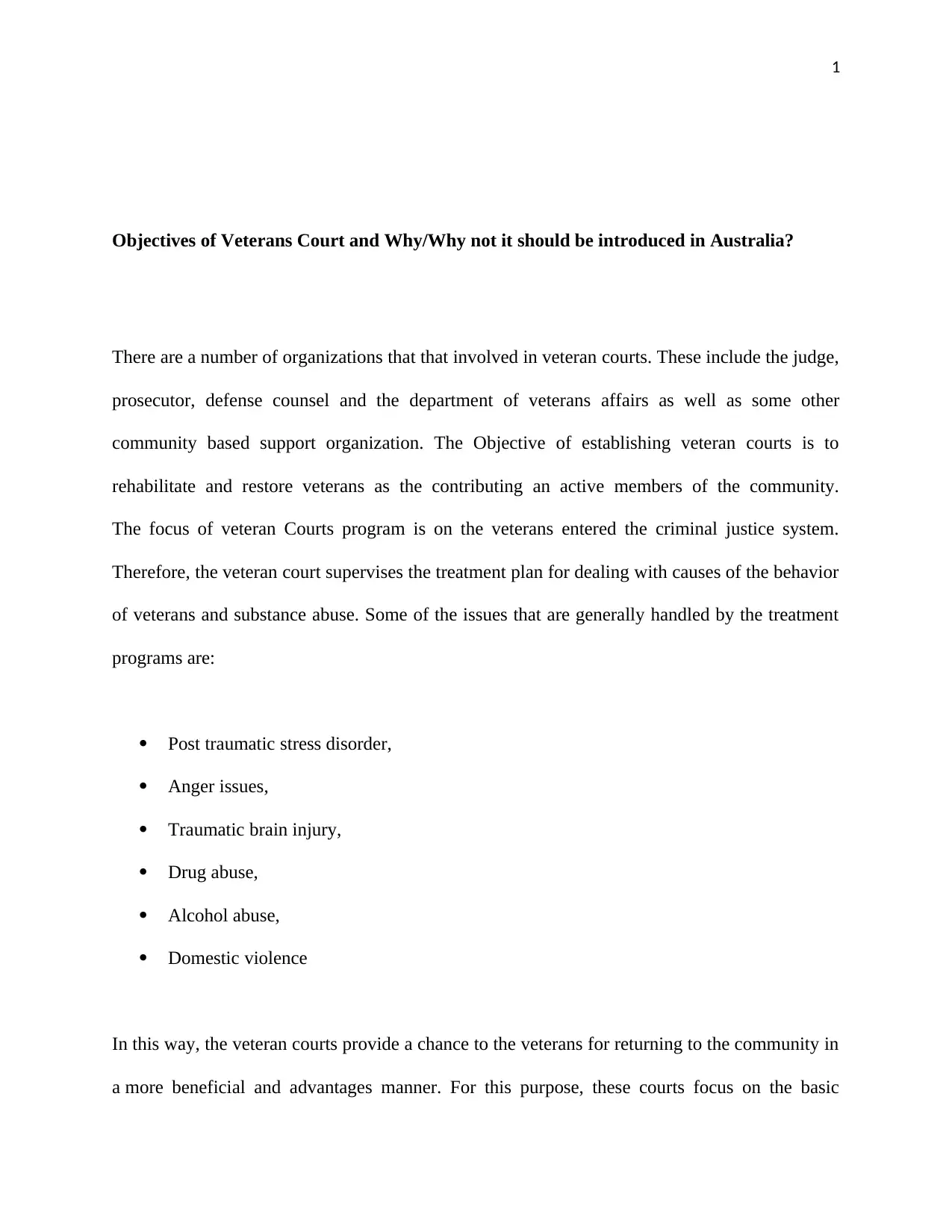
1
Objectives of Veterans Court and Why/Why not it should be introduced in Australia?
There are a number of organizations that that involved in veteran courts. These include the judge,
prosecutor, defense counsel and the department of veterans affairs as well as some other
community based support organization. The Objective of establishing veteran courts is to
rehabilitate and restore veterans as the contributing an active members of the community.
The focus of veteran Courts program is on the veterans entered the criminal justice system.
Therefore, the veteran court supervises the treatment plan for dealing with causes of the behavior
of veterans and substance abuse. Some of the issues that are generally handled by the treatment
programs are:
Post traumatic stress disorder,
Anger issues,
Traumatic brain injury,
Drug abuse,
Alcohol abuse,
Domestic violence
In this way, the veteran courts provide a chance to the veterans for returning to the community in
a more beneficial and advantages manner. For this purpose, these courts focus on the basic
Objectives of Veterans Court and Why/Why not it should be introduced in Australia?
There are a number of organizations that that involved in veteran courts. These include the judge,
prosecutor, defense counsel and the department of veterans affairs as well as some other
community based support organization. The Objective of establishing veteran courts is to
rehabilitate and restore veterans as the contributing an active members of the community.
The focus of veteran Courts program is on the veterans entered the criminal justice system.
Therefore, the veteran court supervises the treatment plan for dealing with causes of the behavior
of veterans and substance abuse. Some of the issues that are generally handled by the treatment
programs are:
Post traumatic stress disorder,
Anger issues,
Traumatic brain injury,
Drug abuse,
Alcohol abuse,
Domestic violence
In this way, the veteran courts provide a chance to the veterans for returning to the community in
a more beneficial and advantages manner. For this purpose, these courts focus on the basic
Paraphrase This Document
Need a fresh take? Get an instant paraphrase of this document with our AI Paraphraser
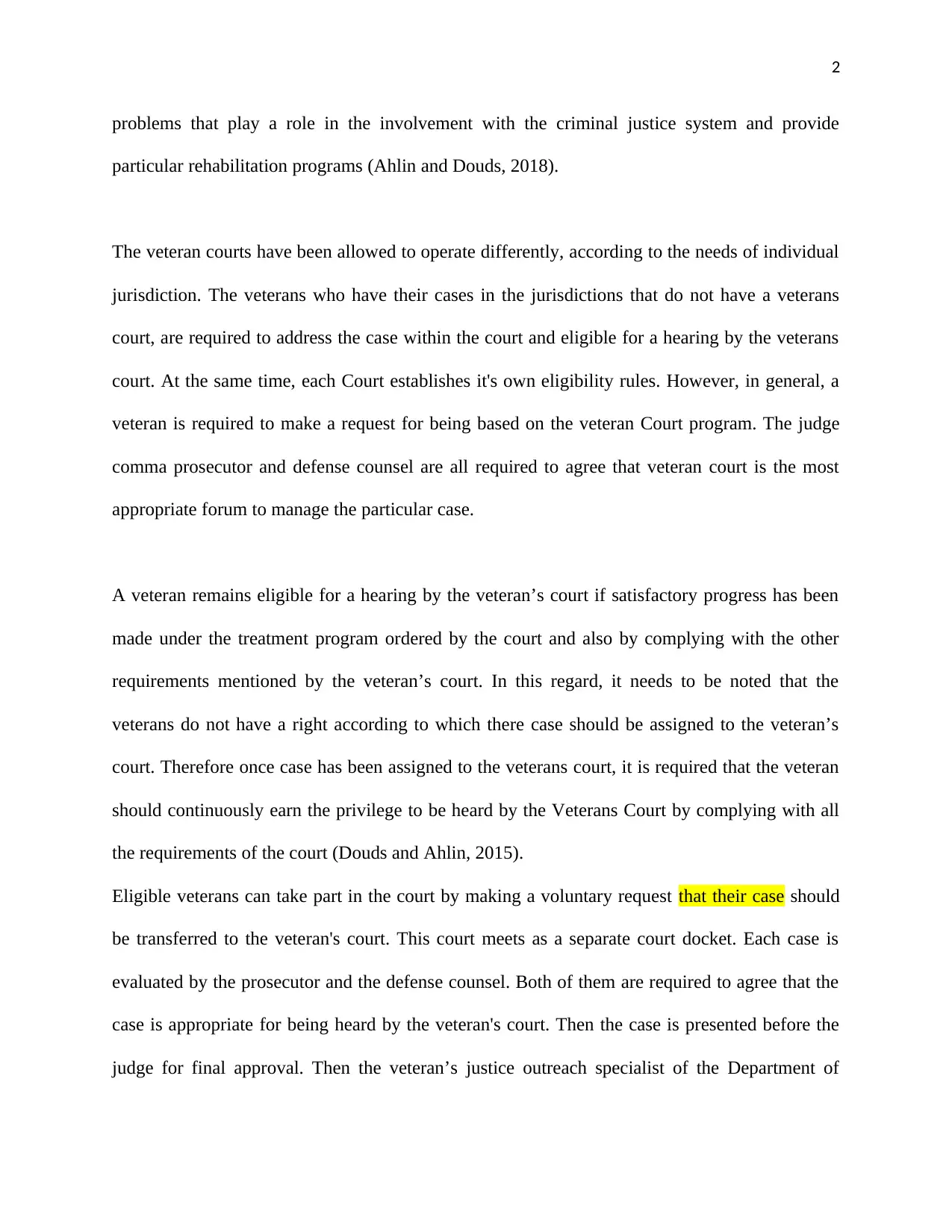
2
problems that play a role in the involvement with the criminal justice system and provide
particular rehabilitation programs (Ahlin and Douds, 2018).
The veteran courts have been allowed to operate differently, according to the needs of individual
jurisdiction. The veterans who have their cases in the jurisdictions that do not have a veterans
court, are required to address the case within the court and eligible for a hearing by the veterans
court. At the same time, each Court establishes it's own eligibility rules. However, in general, a
veteran is required to make a request for being based on the veteran Court program. The judge
comma prosecutor and defense counsel are all required to agree that veteran court is the most
appropriate forum to manage the particular case.
A veteran remains eligible for a hearing by the veteran’s court if satisfactory progress has been
made under the treatment program ordered by the court and also by complying with the other
requirements mentioned by the veteran’s court. In this regard, it needs to be noted that the
veterans do not have a right according to which there case should be assigned to the veteran’s
court. Therefore once case has been assigned to the veterans court, it is required that the veteran
should continuously earn the privilege to be heard by the Veterans Court by complying with all
the requirements of the court (Douds and Ahlin, 2015).
Eligible veterans can take part in the court by making a voluntary request that their case should
be transferred to the veteran's court. This court meets as a separate court docket. Each case is
evaluated by the prosecutor and the defense counsel. Both of them are required to agree that the
case is appropriate for being heard by the veteran's court. Then the case is presented before the
judge for final approval. Then the veteran’s justice outreach specialist of the Department of
problems that play a role in the involvement with the criminal justice system and provide
particular rehabilitation programs (Ahlin and Douds, 2018).
The veteran courts have been allowed to operate differently, according to the needs of individual
jurisdiction. The veterans who have their cases in the jurisdictions that do not have a veterans
court, are required to address the case within the court and eligible for a hearing by the veterans
court. At the same time, each Court establishes it's own eligibility rules. However, in general, a
veteran is required to make a request for being based on the veteran Court program. The judge
comma prosecutor and defense counsel are all required to agree that veteran court is the most
appropriate forum to manage the particular case.
A veteran remains eligible for a hearing by the veteran’s court if satisfactory progress has been
made under the treatment program ordered by the court and also by complying with the other
requirements mentioned by the veteran’s court. In this regard, it needs to be noted that the
veterans do not have a right according to which there case should be assigned to the veteran’s
court. Therefore once case has been assigned to the veterans court, it is required that the veteran
should continuously earn the privilege to be heard by the Veterans Court by complying with all
the requirements of the court (Douds and Ahlin, 2015).
Eligible veterans can take part in the court by making a voluntary request that their case should
be transferred to the veteran's court. This court meets as a separate court docket. Each case is
evaluated by the prosecutor and the defense counsel. Both of them are required to agree that the
case is appropriate for being heard by the veteran's court. Then the case is presented before the
judge for final approval. Then the veteran’s justice outreach specialist of the Department of
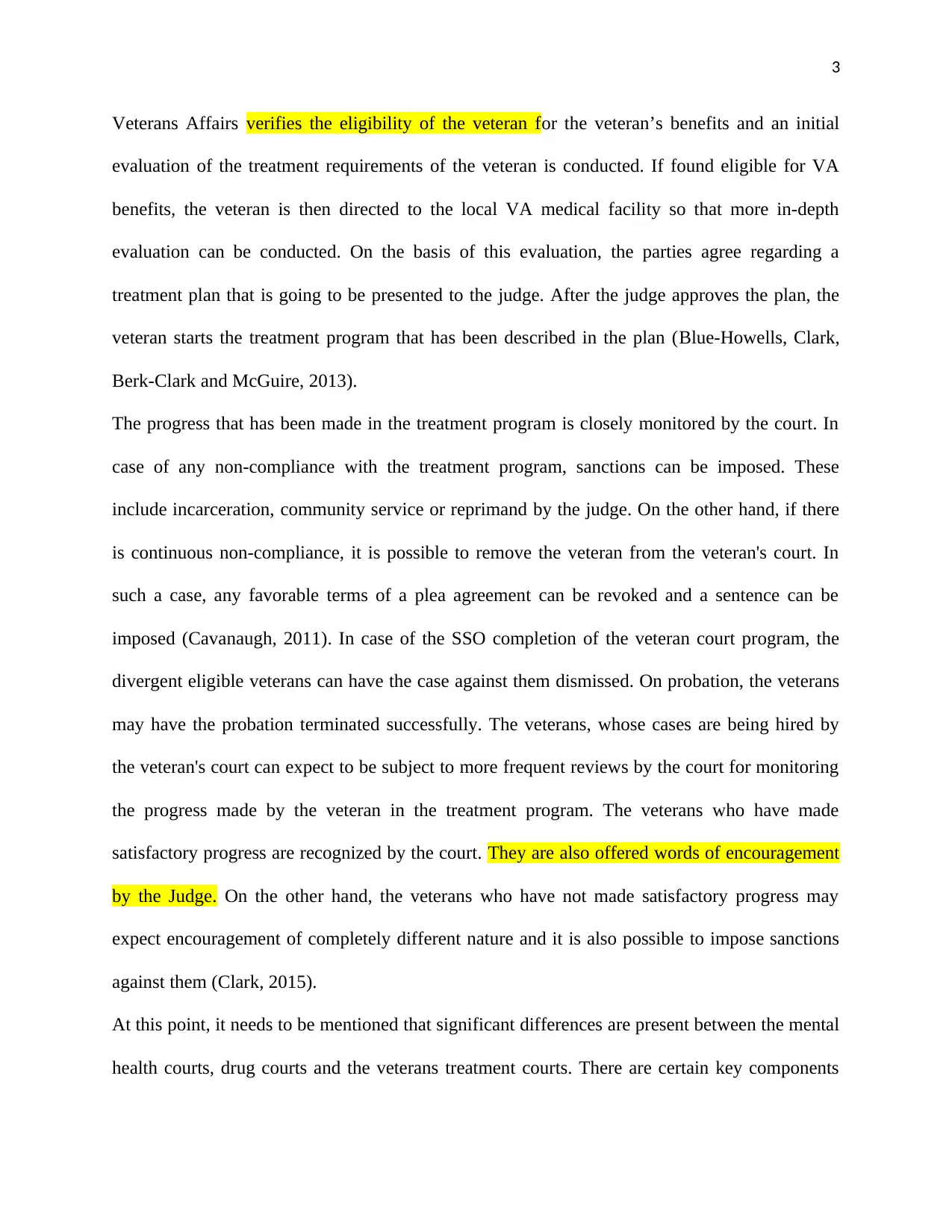
3
Veterans Affairs verifies the eligibility of the veteran for the veteran’s benefits and an initial
evaluation of the treatment requirements of the veteran is conducted. If found eligible for VA
benefits, the veteran is then directed to the local VA medical facility so that more in-depth
evaluation can be conducted. On the basis of this evaluation, the parties agree regarding a
treatment plan that is going to be presented to the judge. After the judge approves the plan, the
veteran starts the treatment program that has been described in the plan (Blue-Howells, Clark,
Berk-Clark and McGuire, 2013).
The progress that has been made in the treatment program is closely monitored by the court. In
case of any non-compliance with the treatment program, sanctions can be imposed. These
include incarceration, community service or reprimand by the judge. On the other hand, if there
is continuous non-compliance, it is possible to remove the veteran from the veteran's court. In
such a case, any favorable terms of a plea agreement can be revoked and a sentence can be
imposed (Cavanaugh, 2011). In case of the SSO completion of the veteran court program, the
divergent eligible veterans can have the case against them dismissed. On probation, the veterans
may have the probation terminated successfully. The veterans, whose cases are being hired by
the veteran's court can expect to be subject to more frequent reviews by the court for monitoring
the progress made by the veteran in the treatment program. The veterans who have made
satisfactory progress are recognized by the court. They are also offered words of encouragement
by the Judge. On the other hand, the veterans who have not made satisfactory progress may
expect encouragement of completely different nature and it is also possible to impose sanctions
against them (Clark, 2015).
At this point, it needs to be mentioned that significant differences are present between the mental
health courts, drug courts and the veterans treatment courts. There are certain key components
Veterans Affairs verifies the eligibility of the veteran for the veteran’s benefits and an initial
evaluation of the treatment requirements of the veteran is conducted. If found eligible for VA
benefits, the veteran is then directed to the local VA medical facility so that more in-depth
evaluation can be conducted. On the basis of this evaluation, the parties agree regarding a
treatment plan that is going to be presented to the judge. After the judge approves the plan, the
veteran starts the treatment program that has been described in the plan (Blue-Howells, Clark,
Berk-Clark and McGuire, 2013).
The progress that has been made in the treatment program is closely monitored by the court. In
case of any non-compliance with the treatment program, sanctions can be imposed. These
include incarceration, community service or reprimand by the judge. On the other hand, if there
is continuous non-compliance, it is possible to remove the veteran from the veteran's court. In
such a case, any favorable terms of a plea agreement can be revoked and a sentence can be
imposed (Cavanaugh, 2011). In case of the SSO completion of the veteran court program, the
divergent eligible veterans can have the case against them dismissed. On probation, the veterans
may have the probation terminated successfully. The veterans, whose cases are being hired by
the veteran's court can expect to be subject to more frequent reviews by the court for monitoring
the progress made by the veteran in the treatment program. The veterans who have made
satisfactory progress are recognized by the court. They are also offered words of encouragement
by the Judge. On the other hand, the veterans who have not made satisfactory progress may
expect encouragement of completely different nature and it is also possible to impose sanctions
against them (Clark, 2015).
At this point, it needs to be mentioned that significant differences are present between the mental
health courts, drug courts and the veterans treatment courts. There are certain key components
⊘ This is a preview!⊘
Do you want full access?
Subscribe today to unlock all pages.

Trusted by 1+ million students worldwide
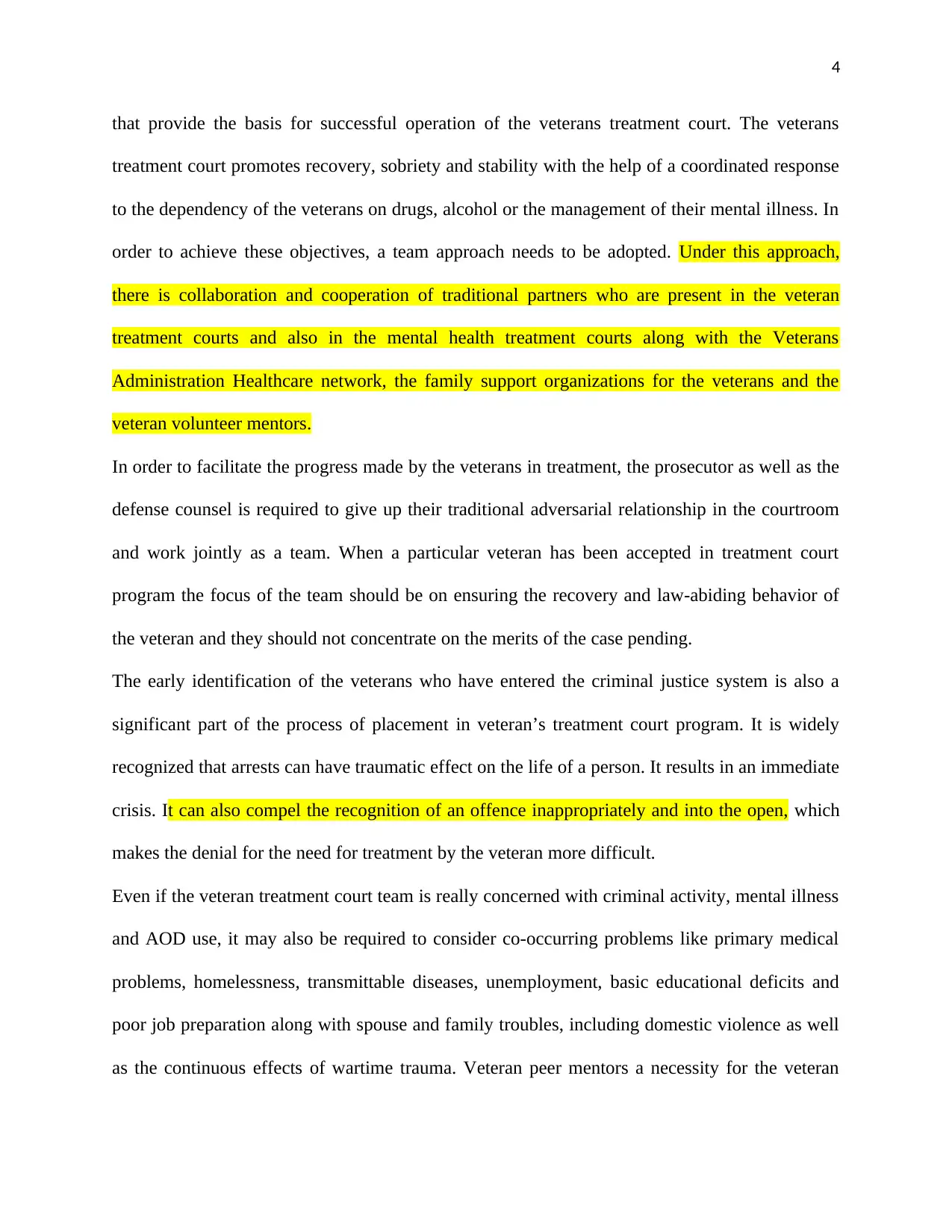
4
that provide the basis for successful operation of the veterans treatment court. The veterans
treatment court promotes recovery, sobriety and stability with the help of a coordinated response
to the dependency of the veterans on drugs, alcohol or the management of their mental illness. In
order to achieve these objectives, a team approach needs to be adopted. Under this approach,
there is collaboration and cooperation of traditional partners who are present in the veteran
treatment courts and also in the mental health treatment courts along with the Veterans
Administration Healthcare network, the family support organizations for the veterans and the
veteran volunteer mentors.
In order to facilitate the progress made by the veterans in treatment, the prosecutor as well as the
defense counsel is required to give up their traditional adversarial relationship in the courtroom
and work jointly as a team. When a particular veteran has been accepted in treatment court
program the focus of the team should be on ensuring the recovery and law-abiding behavior of
the veteran and they should not concentrate on the merits of the case pending.
The early identification of the veterans who have entered the criminal justice system is also a
significant part of the process of placement in veteran’s treatment court program. It is widely
recognized that arrests can have traumatic effect on the life of a person. It results in an immediate
crisis. It can also compel the recognition of an offence inappropriately and into the open, which
makes the denial for the need for treatment by the veteran more difficult.
Even if the veteran treatment court team is really concerned with criminal activity, mental illness
and AOD use, it may also be required to consider co-occurring problems like primary medical
problems, homelessness, transmittable diseases, unemployment, basic educational deficits and
poor job preparation along with spouse and family troubles, including domestic violence as well
as the continuous effects of wartime trauma. Veteran peer mentors a necessity for the veteran
that provide the basis for successful operation of the veterans treatment court. The veterans
treatment court promotes recovery, sobriety and stability with the help of a coordinated response
to the dependency of the veterans on drugs, alcohol or the management of their mental illness. In
order to achieve these objectives, a team approach needs to be adopted. Under this approach,
there is collaboration and cooperation of traditional partners who are present in the veteran
treatment courts and also in the mental health treatment courts along with the Veterans
Administration Healthcare network, the family support organizations for the veterans and the
veteran volunteer mentors.
In order to facilitate the progress made by the veterans in treatment, the prosecutor as well as the
defense counsel is required to give up their traditional adversarial relationship in the courtroom
and work jointly as a team. When a particular veteran has been accepted in treatment court
program the focus of the team should be on ensuring the recovery and law-abiding behavior of
the veteran and they should not concentrate on the merits of the case pending.
The early identification of the veterans who have entered the criminal justice system is also a
significant part of the process of placement in veteran’s treatment court program. It is widely
recognized that arrests can have traumatic effect on the life of a person. It results in an immediate
crisis. It can also compel the recognition of an offence inappropriately and into the open, which
makes the denial for the need for treatment by the veteran more difficult.
Even if the veteran treatment court team is really concerned with criminal activity, mental illness
and AOD use, it may also be required to consider co-occurring problems like primary medical
problems, homelessness, transmittable diseases, unemployment, basic educational deficits and
poor job preparation along with spouse and family troubles, including domestic violence as well
as the continuous effects of wartime trauma. Veteran peer mentors a necessity for the veteran
Paraphrase This Document
Need a fresh take? Get an instant paraphrase of this document with our AI Paraphraser
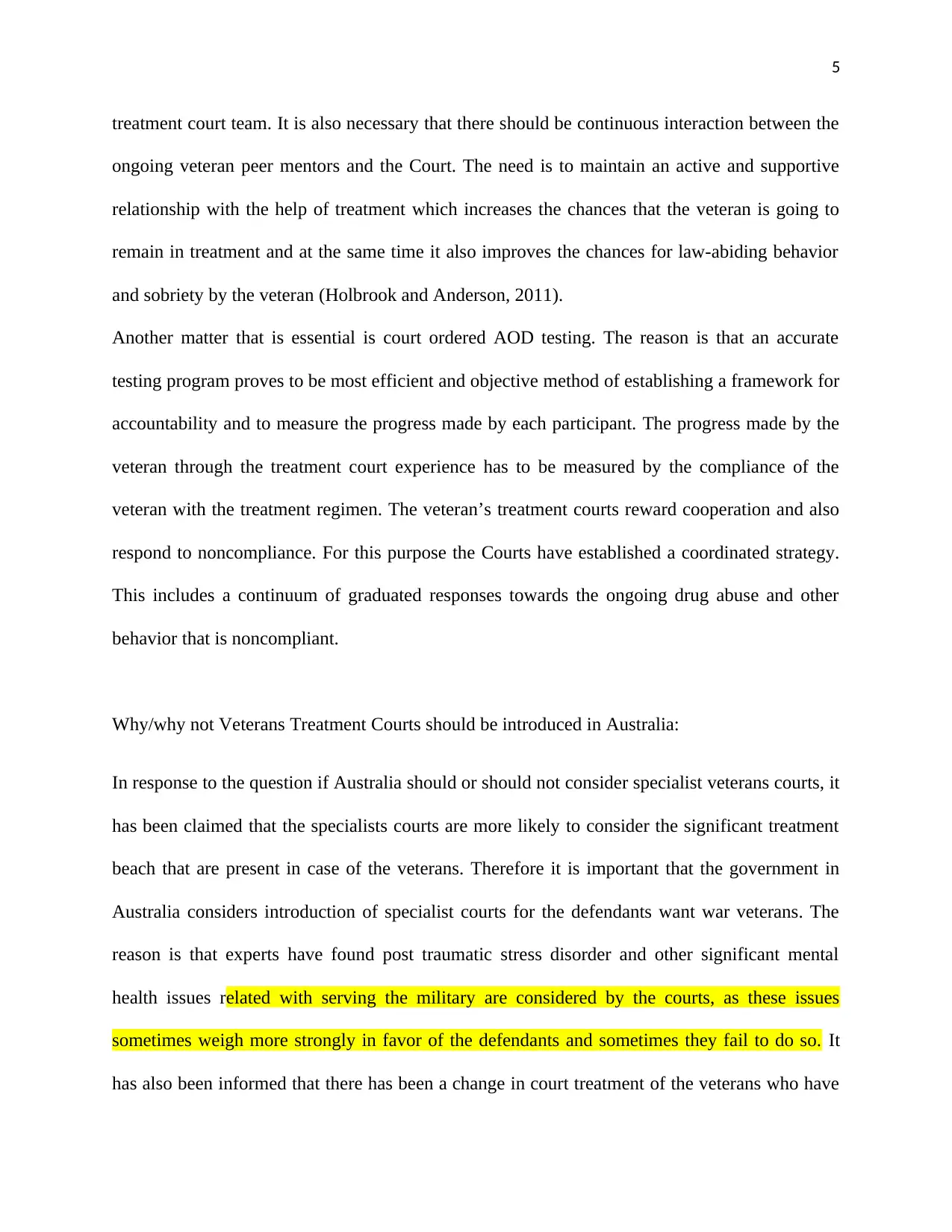
5
treatment court team. It is also necessary that there should be continuous interaction between the
ongoing veteran peer mentors and the Court. The need is to maintain an active and supportive
relationship with the help of treatment which increases the chances that the veteran is going to
remain in treatment and at the same time it also improves the chances for law-abiding behavior
and sobriety by the veteran (Holbrook and Anderson, 2011).
Another matter that is essential is court ordered AOD testing. The reason is that an accurate
testing program proves to be most efficient and objective method of establishing a framework for
accountability and to measure the progress made by each participant. The progress made by the
veteran through the treatment court experience has to be measured by the compliance of the
veteran with the treatment regimen. The veteran’s treatment courts reward cooperation and also
respond to noncompliance. For this purpose the Courts have established a coordinated strategy.
This includes a continuum of graduated responses towards the ongoing drug abuse and other
behavior that is noncompliant.
Why/why not Veterans Treatment Courts should be introduced in Australia:
In response to the question if Australia should or should not consider specialist veterans courts, it
has been claimed that the specialists courts are more likely to consider the significant treatment
beach that are present in case of the veterans. Therefore it is important that the government in
Australia considers introduction of specialist courts for the defendants want war veterans. The
reason is that experts have found post traumatic stress disorder and other significant mental
health issues related with serving the military are considered by the courts, as these issues
sometimes weigh more strongly in favor of the defendants and sometimes they fail to do so. It
has also been informed that there has been a change in court treatment of the veterans who have
treatment court team. It is also necessary that there should be continuous interaction between the
ongoing veteran peer mentors and the Court. The need is to maintain an active and supportive
relationship with the help of treatment which increases the chances that the veteran is going to
remain in treatment and at the same time it also improves the chances for law-abiding behavior
and sobriety by the veteran (Holbrook and Anderson, 2011).
Another matter that is essential is court ordered AOD testing. The reason is that an accurate
testing program proves to be most efficient and objective method of establishing a framework for
accountability and to measure the progress made by each participant. The progress made by the
veteran through the treatment court experience has to be measured by the compliance of the
veteran with the treatment regimen. The veteran’s treatment courts reward cooperation and also
respond to noncompliance. For this purpose the Courts have established a coordinated strategy.
This includes a continuum of graduated responses towards the ongoing drug abuse and other
behavior that is noncompliant.
Why/why not Veterans Treatment Courts should be introduced in Australia:
In response to the question if Australia should or should not consider specialist veterans courts, it
has been claimed that the specialists courts are more likely to consider the significant treatment
beach that are present in case of the veterans. Therefore it is important that the government in
Australia considers introduction of specialist courts for the defendants want war veterans. The
reason is that experts have found post traumatic stress disorder and other significant mental
health issues related with serving the military are considered by the courts, as these issues
sometimes weigh more strongly in favor of the defendants and sometimes they fail to do so. It
has also been informed that there has been a change in court treatment of the veterans who have
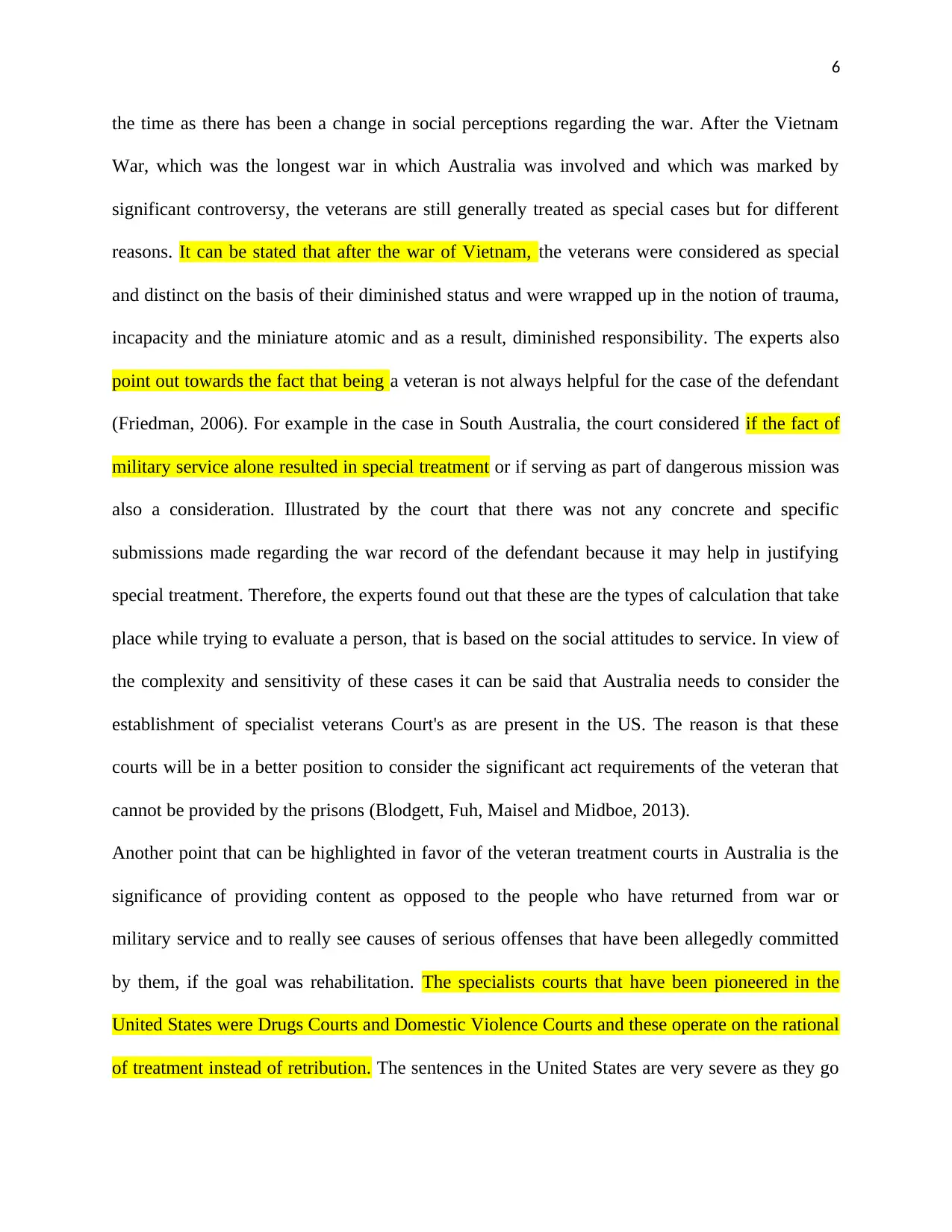
6
the time as there has been a change in social perceptions regarding the war. After the Vietnam
War, which was the longest war in which Australia was involved and which was marked by
significant controversy, the veterans are still generally treated as special cases but for different
reasons. It can be stated that after the war of Vietnam, the veterans were considered as special
and distinct on the basis of their diminished status and were wrapped up in the notion of trauma,
incapacity and the miniature atomic and as a result, diminished responsibility. The experts also
point out towards the fact that being a veteran is not always helpful for the case of the defendant
(Friedman, 2006). For example in the case in South Australia, the court considered if the fact of
military service alone resulted in special treatment or if serving as part of dangerous mission was
also a consideration. Illustrated by the court that there was not any concrete and specific
submissions made regarding the war record of the defendant because it may help in justifying
special treatment. Therefore, the experts found out that these are the types of calculation that take
place while trying to evaluate a person, that is based on the social attitudes to service. In view of
the complexity and sensitivity of these cases it can be said that Australia needs to consider the
establishment of specialist veterans Court's as are present in the US. The reason is that these
courts will be in a better position to consider the significant act requirements of the veteran that
cannot be provided by the prisons (Blodgett, Fuh, Maisel and Midboe, 2013).
Another point that can be highlighted in favor of the veteran treatment courts in Australia is the
significance of providing content as opposed to the people who have returned from war or
military service and to really see causes of serious offenses that have been allegedly committed
by them, if the goal was rehabilitation. The specialists courts that have been pioneered in the
United States were Drugs Courts and Domestic Violence Courts and these operate on the rational
of treatment instead of retribution. The sentences in the United States are very severe as they go
the time as there has been a change in social perceptions regarding the war. After the Vietnam
War, which was the longest war in which Australia was involved and which was marked by
significant controversy, the veterans are still generally treated as special cases but for different
reasons. It can be stated that after the war of Vietnam, the veterans were considered as special
and distinct on the basis of their diminished status and were wrapped up in the notion of trauma,
incapacity and the miniature atomic and as a result, diminished responsibility. The experts also
point out towards the fact that being a veteran is not always helpful for the case of the defendant
(Friedman, 2006). For example in the case in South Australia, the court considered if the fact of
military service alone resulted in special treatment or if serving as part of dangerous mission was
also a consideration. Illustrated by the court that there was not any concrete and specific
submissions made regarding the war record of the defendant because it may help in justifying
special treatment. Therefore, the experts found out that these are the types of calculation that take
place while trying to evaluate a person, that is based on the social attitudes to service. In view of
the complexity and sensitivity of these cases it can be said that Australia needs to consider the
establishment of specialist veterans Court's as are present in the US. The reason is that these
courts will be in a better position to consider the significant act requirements of the veteran that
cannot be provided by the prisons (Blodgett, Fuh, Maisel and Midboe, 2013).
Another point that can be highlighted in favor of the veteran treatment courts in Australia is the
significance of providing content as opposed to the people who have returned from war or
military service and to really see causes of serious offenses that have been allegedly committed
by them, if the goal was rehabilitation. The specialists courts that have been pioneered in the
United States were Drugs Courts and Domestic Violence Courts and these operate on the rational
of treatment instead of retribution. The sentences in the United States are very severe as they go
⊘ This is a preview!⊘
Do you want full access?
Subscribe today to unlock all pages.

Trusted by 1+ million students worldwide
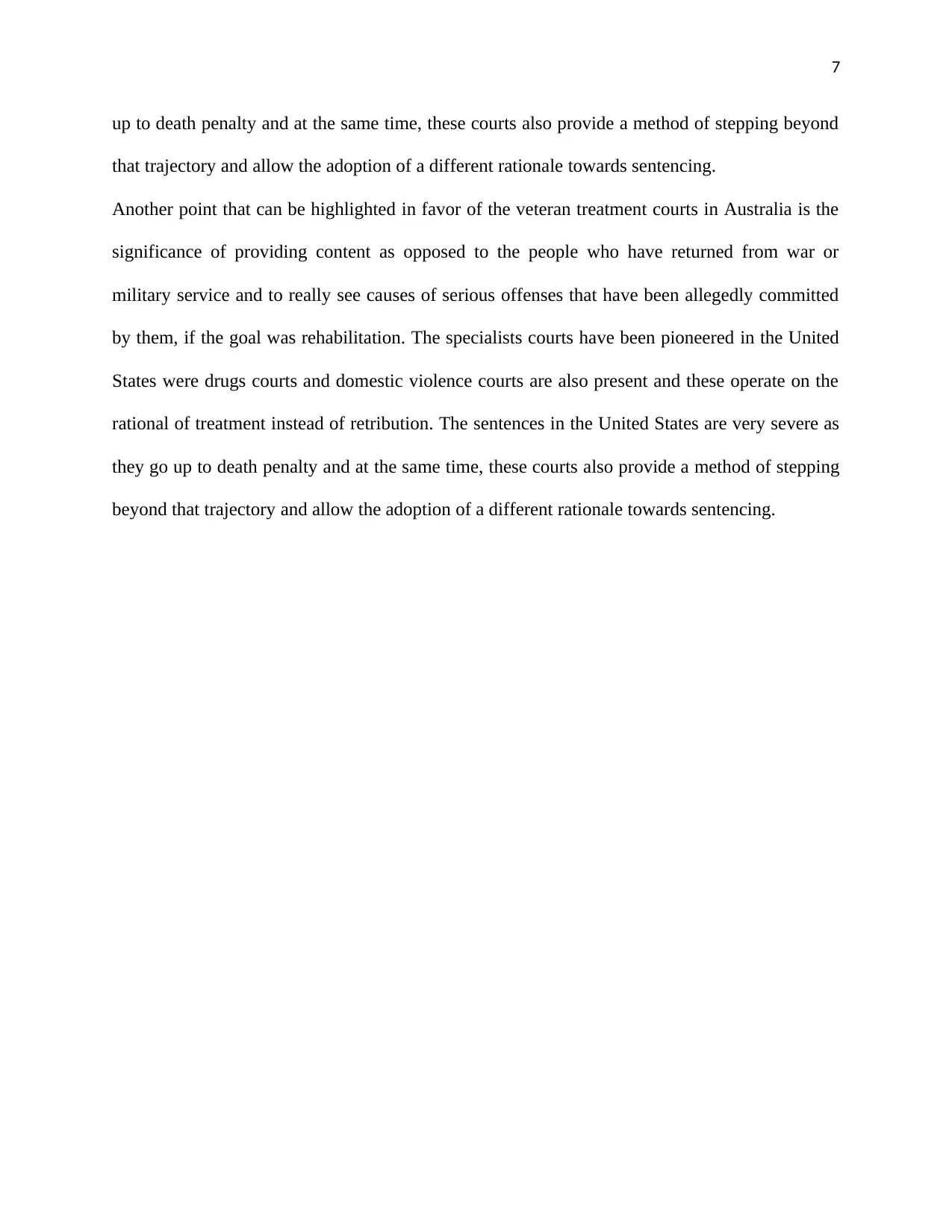
7
up to death penalty and at the same time, these courts also provide a method of stepping beyond
that trajectory and allow the adoption of a different rationale towards sentencing.
Another point that can be highlighted in favor of the veteran treatment courts in Australia is the
significance of providing content as opposed to the people who have returned from war or
military service and to really see causes of serious offenses that have been allegedly committed
by them, if the goal was rehabilitation. The specialists courts have been pioneered in the United
States were drugs courts and domestic violence courts are also present and these operate on the
rational of treatment instead of retribution. The sentences in the United States are very severe as
they go up to death penalty and at the same time, these courts also provide a method of stepping
beyond that trajectory and allow the adoption of a different rationale towards sentencing.
up to death penalty and at the same time, these courts also provide a method of stepping beyond
that trajectory and allow the adoption of a different rationale towards sentencing.
Another point that can be highlighted in favor of the veteran treatment courts in Australia is the
significance of providing content as opposed to the people who have returned from war or
military service and to really see causes of serious offenses that have been allegedly committed
by them, if the goal was rehabilitation. The specialists courts have been pioneered in the United
States were drugs courts and domestic violence courts are also present and these operate on the
rational of treatment instead of retribution. The sentences in the United States are very severe as
they go up to death penalty and at the same time, these courts also provide a method of stepping
beyond that trajectory and allow the adoption of a different rationale towards sentencing.
Paraphrase This Document
Need a fresh take? Get an instant paraphrase of this document with our AI Paraphraser
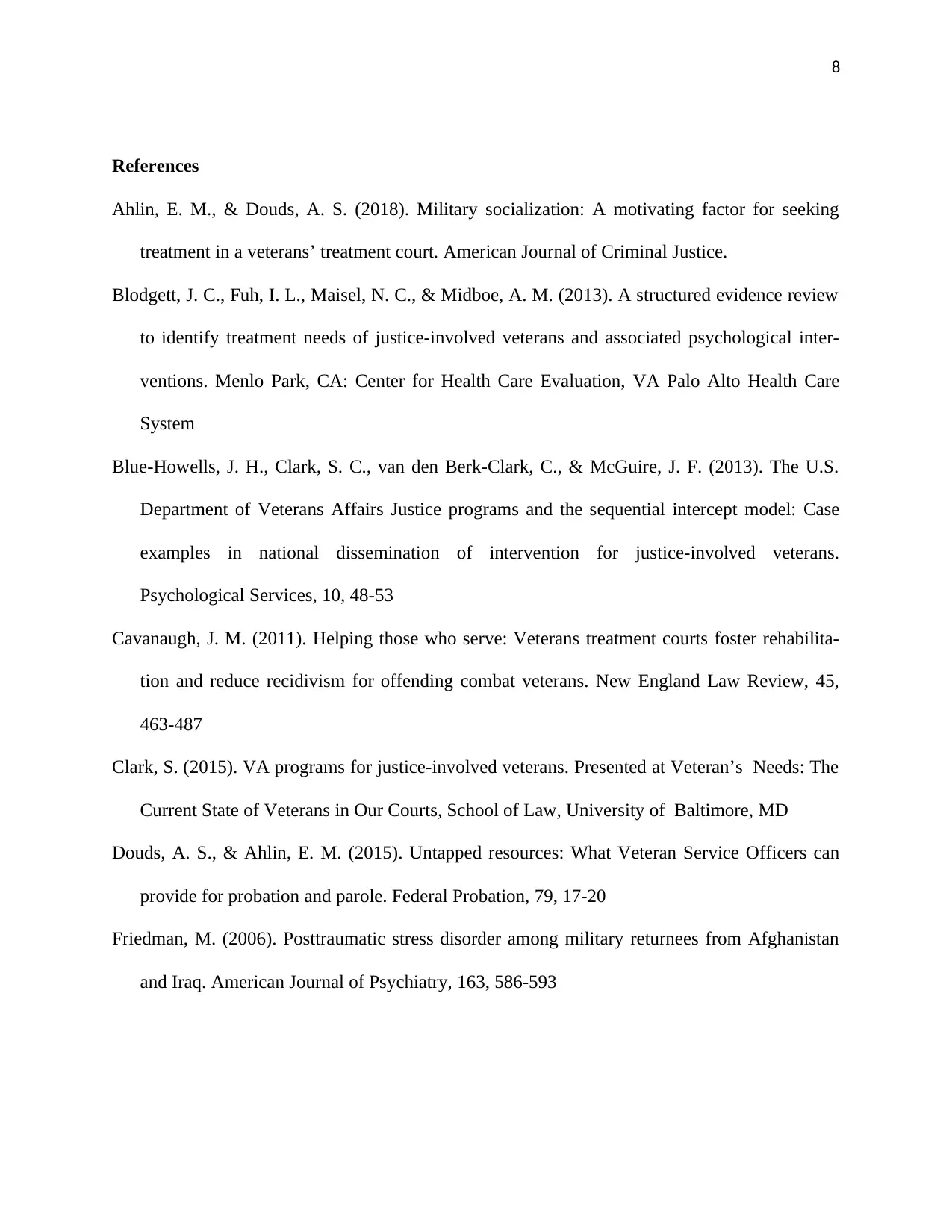
8
References
Ahlin, E. M., & Douds, A. S. (2018). Military socialization: A motivating factor for seeking
treatment in a veterans’ treatment court. American Journal of Criminal Justice.
Blodgett, J. C., Fuh, I. L., Maisel, N. C., & Midboe, A. M. (2013). A structured evidence review
to identify treatment needs of justice-involved veterans and associated psychological inter-
ventions. Menlo Park, CA: Center for Health Care Evaluation, VA Palo Alto Health Care
System
Blue-Howells, J. H., Clark, S. C., van den Berk-Clark, C., & McGuire, J. F. (2013). The U.S.
Department of Veterans Affairs Justice programs and the sequential intercept model: Case
examples in national dissemination of intervention for justice-involved veterans.
Psychological Services, 10, 48-53
Cavanaugh, J. M. (2011). Helping those who serve: Veterans treatment courts foster rehabilita-
tion and reduce recidivism for offending combat veterans. New England Law Review, 45,
463-487
Clark, S. (2015). VA programs for justice-involved veterans. Presented at Veteran’s Needs: The
Current State of Veterans in Our Courts, School of Law, University of Baltimore, MD
Douds, A. S., & Ahlin, E. M. (2015). Untapped resources: What Veteran Service Officers can
provide for probation and parole. Federal Probation, 79, 17-20
Friedman, M. (2006). Posttraumatic stress disorder among military returnees from Afghanistan
and Iraq. American Journal of Psychiatry, 163, 586-593
References
Ahlin, E. M., & Douds, A. S. (2018). Military socialization: A motivating factor for seeking
treatment in a veterans’ treatment court. American Journal of Criminal Justice.
Blodgett, J. C., Fuh, I. L., Maisel, N. C., & Midboe, A. M. (2013). A structured evidence review
to identify treatment needs of justice-involved veterans and associated psychological inter-
ventions. Menlo Park, CA: Center for Health Care Evaluation, VA Palo Alto Health Care
System
Blue-Howells, J. H., Clark, S. C., van den Berk-Clark, C., & McGuire, J. F. (2013). The U.S.
Department of Veterans Affairs Justice programs and the sequential intercept model: Case
examples in national dissemination of intervention for justice-involved veterans.
Psychological Services, 10, 48-53
Cavanaugh, J. M. (2011). Helping those who serve: Veterans treatment courts foster rehabilita-
tion and reduce recidivism for offending combat veterans. New England Law Review, 45,
463-487
Clark, S. (2015). VA programs for justice-involved veterans. Presented at Veteran’s Needs: The
Current State of Veterans in Our Courts, School of Law, University of Baltimore, MD
Douds, A. S., & Ahlin, E. M. (2015). Untapped resources: What Veteran Service Officers can
provide for probation and parole. Federal Probation, 79, 17-20
Friedman, M. (2006). Posttraumatic stress disorder among military returnees from Afghanistan
and Iraq. American Journal of Psychiatry, 163, 586-593

9
Holbrook, J., & Anderson, S. (2011). VTCs: Early outcomes and key indicators for success
(Widener Law School Legal Studies Research Paper Series No. 11-25). Wilmington, DE:
Widener Law School
Holbrook, J., & Anderson, S. (2011). VTCs: Early outcomes and key indicators for success
(Widener Law School Legal Studies Research Paper Series No. 11-25). Wilmington, DE:
Widener Law School
⊘ This is a preview!⊘
Do you want full access?
Subscribe today to unlock all pages.

Trusted by 1+ million students worldwide
1 out of 9
Your All-in-One AI-Powered Toolkit for Academic Success.
+13062052269
info@desklib.com
Available 24*7 on WhatsApp / Email
![[object Object]](/_next/static/media/star-bottom.7253800d.svg)
Unlock your academic potential
Copyright © 2020–2026 A2Z Services. All Rights Reserved. Developed and managed by ZUCOL.


